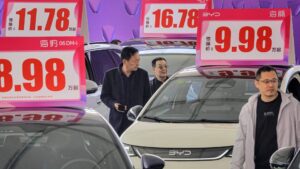The Rising Tide of BYD: Navigating China’s Electric Car Price War
In the bustling world of electric vehicles (EVs), the competition in China’s auto market is intensifying. This transformation isn’t just a local phenomenon; it reverberates through the global automotive landscape. At the forefront of this shift is BYD, a giant in the making that is redefining the parameters of affordability and performance.
BYD Sparks a Price Revolution
Last week, BYD announced dramatic price cuts on a variety of its electric and hybrid models, some reaching as high as 30%. This move has positioned their budget-friendly Seagull compact car at an incredibly attractive price of 55,800 yuan (approximately $7,750). As a result, competitors are feeling the pressure to follow suit, creating a ripple effect in the industry.
Analyst Zhong Shi from the China Automobile Dealers Association aptly noted that "BYD’s action has made the industry rather nervous." This anxiety is not unfounded as smaller, lesser-known automakers grapple with their viability amid this price upheaval.
Driving Economic Impacts
The automotive industry has long been a bright spot in China’s otherwise sluggish economy, currently marred by slow growth and tepid consumer demand. Recently introduced subsidies for new energy vehicles (NEVs) reflect the Chinese government’s attempt to spur consumption and reinforce this industry’s critical role.
Morgan Stanley’s Chief China Economist, Robin Xing, remarked on the ongoing supply-demand imbalance, suggesting that "recent developments indicate the old supply-driven model remains intact." This persistence signals that inflation in the car market could remain elusive.
The Stakes in the Electric Vehicle Price War
China’s electric vehicle market has been embroiled in a price war for two years, heavily influenced by disruptive competitors such as Tesla. Notably, the proportion of NEVs now comprises nearly half of all new passenger vehicles sold in the country. However, heightened competition from new entrants, including traditional automakers, adds fuel to the fire.
Great Wall Motors’ Chairman Wei Jianjun warned of an impending "Evergrande" scenario looming over the auto industry. This comparison is sobering, drawing parallels with the real estate giant that imploded after excessive debt and unsustainable growth models—issues that the EV sector must address to avoid a similar fate.
A Strategic Landscape
While traditional fuel-powered cars saw an 18% price reduction, prices for hybrids and battery-only vehicles fell by 27% and 21%, respectively, over the last two years. In stark contrast, the average new car price in the United States rose to $48,699, and electric cars averaged an even steeper $59,255.
Despite BYD’s aggressive pricing strategy, they haven’t slashed prices on their higher-end models, such as the Han electric sedan, which remains vital for maintaining brand prestige and profitability.
Future Projections: Trends to Watch
The ongoing price war is expected to persist as automakers strive for market dominance. Instead of merely dropping prices, companies might consider adding advanced features as free offerings. For instance, Geely-backed Zeekr has announced free access to its advanced driver-assistance systems, focusing on attracting consumers without additional costs.
The industry’s future will hinge not just on competition within China but also on its strategies to penetrate global markets, including the EU and the U.S., where tariffs are already complicating entry strategies.
Consumer Implications
For buyers, this developing price war could mean a broader selection of affordable electric vehicles with enhanced features. Discerning consumers should keep their eyes peeled for not just price, but also value added through technology and performance.
At Extreme Investor Network, we believe in equipping our readers with the insights necessary to navigate this fast-evolving landscape. The shift towards electric vehicles signals a transformative era that is here to stay. Whether you are an investor, a consumer, or simply an enthusiast, understanding these market dynamics will be crucial for making informed decisions.
Conclusion
The competitive forces at play in China’s electric vehicle market are not just reshaping local economies but are also setting the stage for a global rethink of production, pricing, and consumer engagement in the automotive sector. As BYD leads the charge, the world watches closely how this price war unfolds and the strategies that will define the future of personal transportation.
Stay up-to-date with us at Extreme Investor Network as we continue to analyze and break down the implications of these shifts. Your go-to source for finance insights—don’t miss out!

